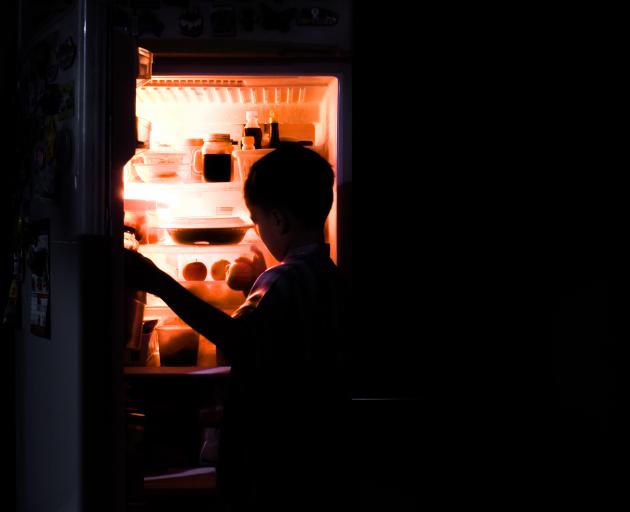

No-one really knows why lack of sleep may have an important role to play in obesity, but she hopes some of her research will help answer the question.
Sleep deprivation may affect what you eat, when you eat and why you eat. There is observational evidence that when we are tired we crave sweeter, energy-dense processed foods such as biscuits and the like, she says.
‘‘I’m interested in whether parenting around food changes if you’ve got a tired child. Perhaps we give them more or different snack foods or change what we cook for meals or whatever to keep the peace, but that, of course, is very difficult to measure.’’
Short sleep is a risk factor for obesity in adults. A recent paper measured dietary intake in adults according to chronotype - whether they were morning larks or night owls. It found those who ate a lot of food in the two hours before they went to bed had a higher risk of obesity, especially if they were a night owl, whereas people who ate a big breakfast within a couple of hours of getting up, particularly if they were a morning lark, had a much lower risk of obesity, Prof Taylor said.

She and her colleagues have been studying children from 8-12 years of age who theoretically sleep sufficiently, meeting current sleep guidelines of eight-11 hours a night.
‘‘We work out what their normal sleep patterns are, and for one week they go to bed one hour later than they usually do - but they get up at the same time, so that basically creates a wee sleep deficit. We are measuring whether their time to go to sleep, their sleep latency, their sleep duration changes.
‘‘Then on another week they go to bed an hour earlier than normal. Virtually all those children on that earlier bedtime managed to extend their sleep, suggesting they are not actually getting enough on their normal sleep pattern. For some of these kids it’s only 15 minutes, for some it’s close to an hour of the extra opportunity they’ve been given,’’ she said.
‘‘We are measuring all sorts of things but it’s amazing how many of them are saying ‘wow I do feel better’, which would suggest that though they are meeting the recommendations they are not meeting their own sleep needs.’’
Another experiment she and her team of researchers did with newborn babies and their parents had a surprising outcome.
They recruited 800 Dunedin women in the latter stages of pregnancy. Half of them got a very brief sleep intervention and half of them did not.
‘‘At the start we told them they were going to be very tired and that would last some considerable time but we were there to help, and we had ways to help them help their infants learn how to sleep better,’’ she said.
‘‘When their babies were about 3 weeks old we went into the home and saw where they were sleeping and how they were sleeping and how it was going. Essentially, what we could do to help was get the infant to learn how to self-settle to sleep by not going to them on the very first cry and not seeing food as the first sign of soothing all the time.’’
We all wake up in the night many times but we do not realise it most of the time. Babies also wake up in the night often, but do not always need to be fed - often, but not always, she said.
‘‘They might cry for a little bit and go back to sleep. And learning to recognise the tired signs — you want to put your baby to bed when they are awake but drowsy. They are not overtired and they are not under-tired. It’s the yawning, maybe a wee bit of grizzling, but you are helping them to learn to go sleep by themselves and therefore they can do it again in the night when they wake up.’’
When the babies were 6 months old, her team offered additional help if the parents felt their child had a sleep problem.
‘‘It was a very brief intervention and really, to our amazement, those children who received it had only half the risk of obesity at 5 years of age as kids who didn’t receive the sleep intervention.’’
She had recently received funding to see if those benefits are still working now the children are 10 years old, she said.
‘‘If you sleep well life is easier in a whole variety of things, whether you’re a parent or a child. If you get good sleep you are setting yourself up for a good day. Sure, there are other things that come into play but I think sleep is a very under-valued health behaviour in today’s world.’’
Although the Ministry of Health provides some sleep guidelines, health messages on sleep are rarely promoted, unlike messages about diet and exercise.
‘‘One of the issues with the current guidelines is that they have been developed from reported sleep duration in people as opposed to how much sleep people actually need. How much sleep people need is very difficult to determine at a population level because how much sleep you need and how much sleep I need could be very different.’’
Prof Taylor said a lot of people, from children through to the elderly, did not get adequate sleep — but this was not something people paid a lot of attention to.
‘‘It would be good if people could be more aware of sleep and the importance of sleep and think of sleep in a positive way — how can I improve my own sleep; how can I improve the sleep of my kids? Don’t think of it as a waste of time when you could be doing other things.’’
Getting 40 winks
To help get good sleep night after night, Prof Taylor recommends:
- Gradually bringing bedtime a little earlier because getting up times in the mornings are more difficult to change.
- Avoid using devices for an hour or so before bed or watching television in bed. Listen to the radio with eyes closed, or read a book — preferably an old fashioned paper book as these are good for promoting sleep.
- A heavy meal just before bed can disturb sleep.
- Alcohol may put you to sleep but you don’t get a long-lasting, good REM sleep, which is the most restorative.
- Exercise is good for our sleep but heavy exercise just prior to sleep is usually not ideal.











